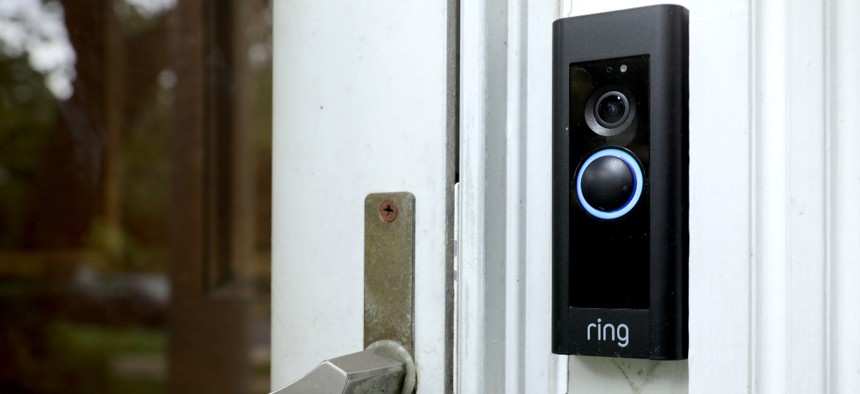Amazon Admits to Giving Police Ring Footage Without Owners’ Permission

Chip Somodevilla/Getty Images
The smart-doorbell company, which has partnered with more than 2,000 law enforcement agencies, said in a letter that it shared multiple videos with police departments without first seeking user consent.
Amazon has provided video footage from its Ring doorbell cameras to police without users’ consent 11 times this year, according to a letter from the company that was released by Sen. Ed Markey, D-Mass., on Wednesday.
The disclosure came in response to a separate letter that Markey sent to the company last month questioning Ring’s surveillance practices and data sharing relationship with police departments across the country. While the company’s law enforcement guidelines state that it typically notifies doorbell owners before sharing requested information with police, Ring’s policy allows for police to submit emergency disclosure requests “in cases involving imminent danger of death or serious physical injury to any person,” without the users’ permission.
“In each instance, Ring made a good-faith determination that there was an imminent danger of death or serious physical injury to a person requiring disclosure of information without delay,” wrote Brian Huseman, Amazon’s vice president for public policy.
Lawmakers have raised privacy concerns over the past few years about Ring’s data sharing partnerships with police departments. A growing number of law enforcement agencies use the company’s Neighbors Public Safety Service, a platform which allows the police to send alerts and request information from Ring users. Amazon’s letter said that 2,161 law enforcement agencies currently have access to the Neighbors portal—a more than five-fold increase in the number of law enforcement agencies that have partnered with Ring since November 2019, according to Markey’s office.
“Increasing law enforcement reliance on private surveillance creates a crisis of accountability, and I am particularly concerned that biometric surveillance could become central to the growing web of surveillance systems that Amazon and other powerful tech companies are responsible for,” Markey said in a statement.
Amazon’s letter to Markey cited the company’s ongoing efforts to address concerns about users’ civil liberties, noting that the company made over 100 changes to its “products, policies and legal practices” during the course of an almost two-year audit conducted by the Policing Project at New York University School of Law.
Following the release of its letter, Ring defended its decision to disclose some users’ information to law enforcement without any prior notice.
“It’s simply untrue that Ring gives anyone unfettered access to customer data or video, as we have repeatedly made clear to our customers and others,” a Ring spokesperson said in a statement. “The law authorizes companies like Ring to provide information to government entities if the company believes that an emergency involving danger of death or serious physical injury to any person, such as a kidnapping or an attempted murder, requires disclosure without delay. Ring faithfully applies that legal standard.”






